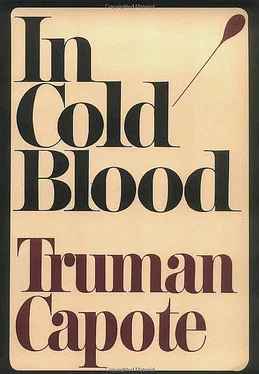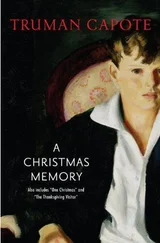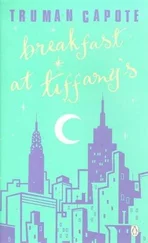“You damn well better.”
Dick tried. “There’s him. Her. The kid and the girl. And maybe the other two. But it’s Saturday. They might have guests. Let’s count on eight, or even twelve. The only sure thing is everyone of them has got to go.”
“Seems like a lot of it. To be so sure about.”
“Ain’t that what I promised you, honey—plenty of hair on them-those walls?”
Perry shrugged. “Then we’d better buy the whole roll.”
It was a hundred yards long—quite enough for twelve.
Kenyon had built the chest himself: a mahogany hope chest, lined with cedar, which he intended to give Beverly as a wedding present. Now, working on it in the so-called den in the basement, he applied a last coat of varnish. The furniture of the den, a cement-floored room that ran the length of the house, consisted almost entirely of examples of his carpentry (shelves, tables, stools, a ping-pong table) and Nancy’s needlework (chintz slip covers that rejuvenated a decrepit couch, curtains, pillows bearing legends: happy? and You don’t have to be crazy to live here but it helps). Together, Kenyon and Nancy had made a paint-splattered attempt to deprive the basement room of its un-removable dourness, and neither was aware of failure. In fact, they both thought their den a triumph and a blessing—Nancy because it was a place where she could entertain “the gang” without disturbing her mother, and Kenyon because here he could be alone, free to bang, saw, and mess with his “inventions,” the newest of which was an electric deep-dish frying pan. Adjoining the den was a furnace room, which contained a tool-littered table piled with some of his other works-in-progress—an amplifying unit, an elderly wind-up Victrola that he was restoring to service.
Kenyon resembled neither of his parents physically; his crew-cut hair was hemp-colored, and he was six feet tall and lanky, though hefty enough to have once rescued a pair of full-grown sheep by carrying them two miles through a blizzard—sturdy, strong, but cursed with a lanky boy’s lack of muscular co-ordination. This defect, aggravated by an inability to function without glasses, prevented him from taking more than a token part in those team sports (basketball, baseball) that were the main occupation of most of the boys who might have been his friends. He had only one close friend—Bob Jones, the son of Taylor Jones, whose ranch was a mile west of the Clutter home. Out in rural Kansas, boys start driving cars very young; Kenyon was eleven when his father allowed him to buy, with money he had earned raising sheep, an old truck with a Model A engine—the Coyote Wagon, he and Bob called it. Not far from River Valley Farm there is a mysterious stretch of countryside known as the Sand Hills; it is like a beach without an ocean, and at night coyotes slink among the dunes, assembling in hordes to howl. On moonlit evenings the boys would descend upon them, set them running, and try to outrace them in the wagon; they seldom did, for the scrawniest coyote can hit fifty miles an hour, whereas the wagon’s top speed was thirty-five, but it was a wild and beautiful kind of fun, the wagon skidding across the sand, the fleeing coyotes framed against the moon—as Bob said, it sure made your heart hurry.
Equally intoxicating, and more profitable, were the rabbit roundups the two boys conducted: Kenyon was a good shot and his friend a better one, and between them they sometimes delivered half a hundred rabbits to the “rabbit factory”—a Garden City processing plant that paid ten cents a head for the animals, which were then quick-frozen and shipped to mink growers. But what meant most to Kenyon—and Bob, too—was their weekend, overnight hunting hikes along the shores of the river: wandering, wrapping up in blankets, listening at sunrise for the noise of wings, moving toward the sound on tiptoe, and then, sweetest of all, swaggering homeward with a dozen duck dinners swinging on their belts. But lately things had changed between Kenyon and his friend. They had not quarreled, there had been no over falling-out, nothing had happened except that Bob, who was sixteen, had started “going with a girl,” which meant that Kenyon, a year younger and still very much the adolescent bachelor, could no longer count on his companionship. Bob told him, “When you’re my age, you’ll feel different. I used to think the same as you: Women—so what? But then you get to talking to some woman, and it’s mighty nice. You’ll see.” Kenyon doubted it; he could not conceive of ever wanting to waste an hour on any girl that might be spent with guns, horses, tools, machinery, even a book. If Bob was unavailable, then he would rather be alone, for in temperament he was not in the least Mr. Clutter’s son but rather Bonnie’s child, a sensitive and reticent boy. His contemporaries thought him “stand-offish,” yet forgave him, saying, “Oh, Kenyon. It’s just that he lives in a world of his own.”
Leaving the varnish to dry, he went on to another chore—one that took him out-of-doors. He wanted to tidy up his mother’s flower garden, a treasured patch of disheveled foliage that grew beneath her bedroom window. When he got there, he found one of the hired men loosening earth with a spade—Paul Helm, the husband of the housekeeper.
“Seen that car?” Mr. Helm asked.
Yes, Kenyon had seen a car in the driveway—a gray Buick, standing outside the entrance to his father’s office.
“Thought you might know who it was.”
“Not unless it’s Mr. Johnson. Dad said he was expecting him.”
Mr. Helm (the late Mr. Helm; he died of a stroke the following March) was a somber man in his late fifties whose withdrawn manner veiled a nature keenly curious and watchful; he liked to know what was going on. “Which Johnson?”
“The insurance fellow.”
Mr. Helm grunted. “Your dad must be laying in a stack of it. That car’s been here I’d say three hours.”
The chill of oncoming dusk shivered through the air, and though the sky was still deep blue, lengthening shadows emanated from the garden’s tall chrysanthemum stalks; Nancy’s cat frolicked among them, catching its paws in the twine with which Kenyon and the old man were now tying plants. Suddenly, Nancy herself came jogging across the fields aboard fat Babe—Babe, returning from her Saturday treat, a bathe in the river. Teddy, the dog, accompanied them, and all three were water-splashed and shining.
“You’ll catch cold,” Mr. Helm said.
Nancy laughed; she had never been ill—not once. Sliding off Babe, she sprawled on the grass at the edge of the garden and seized her cat, dangled him above her, and kissed his nose and whiskers.
Kenyon was disgusted. “ Kissing animals on the mouth.”
“You used to kiss Skeeter,” she reminded him.
“Skeeter was a horse ”A beautiful horse, a strawberry stallion he had raised from a foal. How that Skeeter could take a fence! “You use a horse too hard,” his father had cautioned him. “One day you’ll ride the life out of Skeeter.” And he had; while Skeeter was streaking down a road with his master astride him, his heart failed, and he stumbled and was dead. Now, a year later, Kenyon still mourned him, even though his father, taking pity on him, had promised him the pick of next spring’s foals.
“Kenyon?” Nancy said. “Do you think Tracy will be able to talk? By Thanksgiving?” Tracy, not yet a year old, was her nephew, the son of Eveanna, the sister to whom she felt particularly close. (Beverly was Kenyon’s favorite.) “It would thrill me to pieces to hear him say ‘Aunt Nancy.’ Or ‘Uncle Kenyon. ‘Wouldn’t you like to hear him say that? I mean, don’t you love being an uncle? Kenyon? Good grief, why can’t you ever answer me?”
Читать дальше












